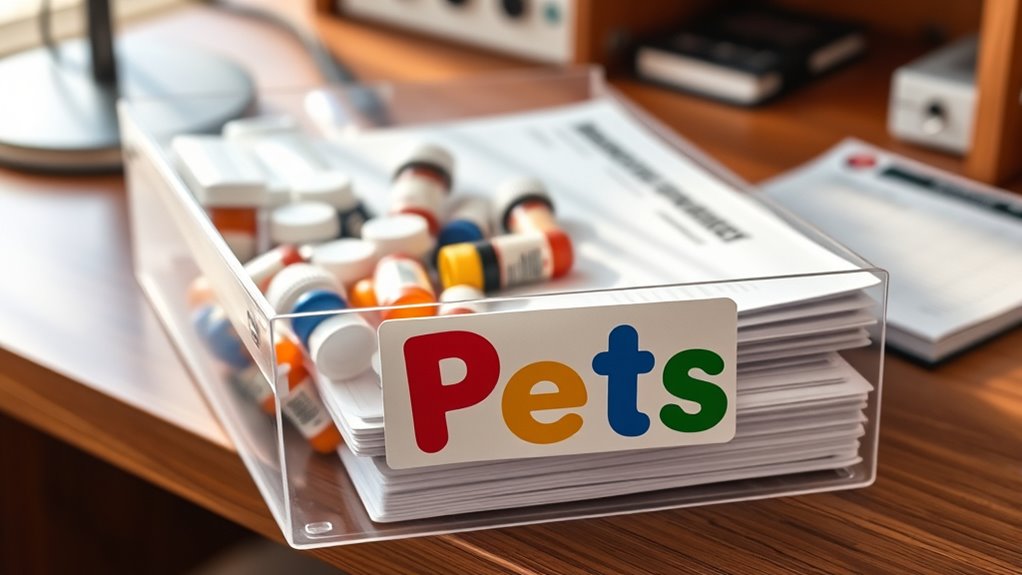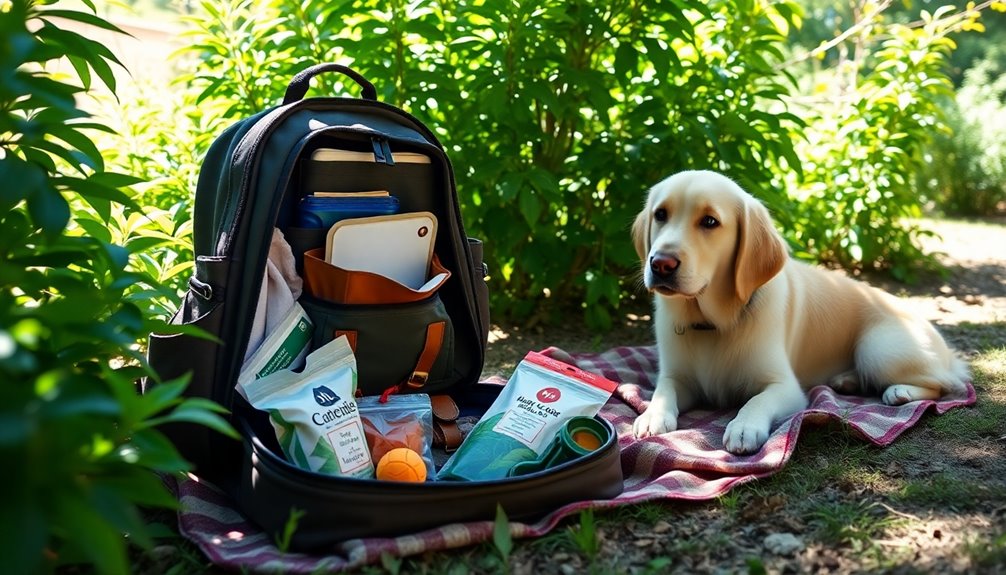Creating a pet go-folder helps you keep all health records, medication info, and emergency contacts organized in one place. Gather documents like vaccination records, vet visits, and lab results, then store them in labeled sections or sleeves for easy access. Update the folder regularly with new information and track medication changes. An organized go-folder guarantees quick responses during emergencies and routine visits, making pet care smoother. Keep exploring for more tips to maintain your pet’s health records efficiently.
Key Takeaways
- Gather all pet health records, vaccination info, and medication details, and organize them in clear, labeled sections within the go-folder.
- Use plastic sleeves or folders to protect documents and create dedicated sections for medications and vet records.
- Regularly update the folder with new vet visits, test results, medication changes, and allergy information.
- Include emergency contacts, medication instructions, and important health milestone dates for quick reference.
- Maintain the system consistently to prevent errors, ensure easy access, and support proactive pet health management.

Keeping track of your pet’s medications and records is essential for their health and well-being. When you stay organized with a dedicated go-folder, you make pet health tracking and medication management much easier. This folder becomes your go-to resource, guaranteeing that you always have quick access to critical information when needed. Whether it’s a routine check-up or an emergency, having all records in one place saves you time and reduces stress.
Stay organized with a pet health go-folder for quick access to vital records and medications.
Start by gathering all relevant documents, such as vaccination records, recent vet visits, medication lists, and any lab results. Store these in clear, labeled plastic sleeves or folders within your go-folder, so you can easily find what you need. Keep a section specifically for current medications, including dosage instructions, prescribed duration, and the prescribing veterinarian’s contact information. This way, you won’t accidentally double-dose or miss giving your pet their meds. It also helps if you need to communicate with your vet about ongoing treatments or new prescriptions.
Regularly updating your pet’s records is key. Every time your pet sees the vet, ask for copies of their latest reports and add them to your folder. If your pet’s medication regimen changes, update the details immediately. Keeping your pet’s medication management organized helps prevent errors and guarantees your pet receives the right treatment at the right time. It’s especially useful if you have multiple caregivers or if you’re planning to travel, as you’ll always have an all-inclusive health snapshot ready.
Another tip is to note down any allergies or adverse reactions your pet has experienced. This information is essential for future vet visits or if you switch to a new medication. Also, consider including a list of emergency contacts, such as your vet’s number, an emergency animal hospital, and poison control. This makes it easier to act swiftly in urgent situations.
To optimize pet health tracking, set a reminder system for upcoming vaccinations, flea and tick preventatives, and annual check-ups. You can use digital tools or a calendar, but keeping a physical record in your pet’s go-folder guarantees you never forget important dates. The more organized you are, the better you can manage your pet’s health proactively, catching potential issues early and maintaining their overall well-being. Staying aware of relationship dynamics can also help you better understand and care for your pet’s emotional needs, especially during stressful times. Creating and maintaining this go-folder is a small effort that pays off by giving you peace of mind and ensuring your pet gets the best care possible.
Frequently Asked Questions
How Often Should I Update My Pet’s Medical Records?
You should update your pet’s medical records after every veterinary visit to guarantee record maintenance is current. Regular updates help track vaccinations, treatments, and health changes. It’s also a good idea to review records at least once a year, even if no visits occur, to keep everything organized. Staying on top of updates ensures you have accurate information ready for emergencies and vet appointments, making your pet’s care more effective.
What Should I Include in a Pet Emergency Record?
In your pet emergency record, you should include vital details like known pet allergies, so responders know what to avoid. Keep emergency contacts handy, including your veterinarian and nearby clinics, in case of urgent needs. Don’t forget to add recent medical history, medication info, and any special care instructions. This info could be the key to saving your pet’s life during a crisis, so keep it up-to-date and easily accessible.
How Do I Store Medications Safely in a Go‑Folder?
To store medications safely in your go‑folder, keep them in their original containers with labels intact for medication safety. Use small, clear compartments or envelopes to organize each pet’s medications and prescriptions. Regularly check expiration dates and replace expired items. Label each section clearly for quick access, ensuring your records stay organized. This way, you can quickly find and safely use medications during emergencies, ensuring your pet’s safety.
Can I Use a Digital App Instead of a Physical Go‑Folder?
Think of a digital app as a sleek, digital filing cabinet for your pet’s health. Yes, you can use one instead of a physical go-folder. These apps offer features like reminders, photo storage, and easy sharing, making organization a breeze. With digital organization, you keep everything at your fingertips, ready to access anytime. Just pick an app with robust features, and your pet’s records will stay safe and well-organized in the cloud.
How Do I Organize Records for Multiple Pets?
To organize records for multiple pets, set up a clear pet record system that includes each pet’s health history, vaccination records, and medication logs. Use labeled folders or digital files for multi-pet organization, ensuring each pet has its own section. Regularly update the system to keep records current. This helps you easily access information when needed and keeps everything organized, reducing stress during vet visits or emergencies.
Conclusion
So, next time your pet needs medication or a vet visit, don’t scramble for papers or guess their history. Thanks to your handy go-folder, you’ll be the hero who’s always prepared—because nothing says “responsible pet parent” like having everything at your fingertips. Ironically, it’s the simple act of organizing that can save you stress and time in a crisis. After all, your pet deserves peace of mind—starting with a well-structured record, not a frantic search.









